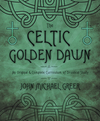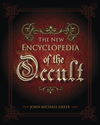The Real Origins of Magic and Paganism

Through a crisis in my own magical training, I developed The New Encyclopedia of the Occult. Like many people, I came to the world of occultism with a head full of romantic legends about magic, and the books and teachings I encountered did nothing to dispel those. On the contrary, authors and teachers routinely claimed that their traditions had been passed down unchanged for thousands of years from neolithic priestesses, Egyptian initiation temples, the builders of Stonehenge, or the Sun Priests of ancient Atlantis. As a teenager with a head full of fantasy fiction, I found all this intensely appealing.
Years of study and practice taught me that these magical traditions had an enormous amount of information to offer the modern seeker. Through magical meditation, ritual, visionary experience, and self-initiation, I learned a great deal about the universe, and about myself. I was able to achieve things that seemed completely out of reach when I first set out on the magical path. Yet when I tried to learn more about the origins of these teachings, I discovered that most historical claims being made in the magical and Pagan communities simply weren't true. Many contradicted known facts, and quite a few contradicted themselves.
That realization was the beginning of a quest for the actual origins of our modern magical and Pagan traditions, using the tools of the historian alongside those of the occultist. Fortunately, a handful of academic historians were on the same quest, and their books provided vital starting points. Following those leads, I found myself searching through occult traditions forgotten for centuries, and gradually uncovered the origin—or, rather, the origins—of today's magical systems and Pagan spirituality.
The good news is that many of our modern traditions do reach back through centuries, some to ancient Egypt, some to ancient Greece and Rome, others to European Pagan lore. The other good news, though some might consider it bad news, is that none of it came down unchanged, or by the unbroken lineages of magical and Pagan mythology. A few elements, a few themes and ideas, and a small number of practices can be traced into the distant past. Many of the modern practices have more recent origins, and some elements that seem the most ancient are actually very new.
What comes through most clearly is the central place of creativity in the life of magical and Pagan traditions. Historical myths of today's occultism, talking of archaic teachings handed down by rote through an endless series of identical third-degree grandmothers turned out by some granny factory in the New Forest, make it seem as though creativity has no place in magic or Paganism. Nothing could be further from the truth.
A tradition can be gray with the dust of centuries and still be useless, or even actively harmful. The mark of age is no guarantee of value. In the same way, some recently founded traditions have been condemned for the simple fact of being new; those who pass such judgment forget that their own traditions were also new at some point in history. The claim that people of an ancient time were allowed to invent new ways of understanding and shaping the cosmos is questionable when one then turns around and says that modern people have no right to do the same thing.
Whatever the actual origins of Gerald Gardner's Wicca or the Hermetic Order of the Golden Dawn, for instance, it's clear that neither one simply copied older systems; both Gardner and the Golden Dawn's chiefs were constantly borrowing, revising, exploring, and expanding what they inherited, when they weren't simply innovating. In the same way, the Tarot deck doesn't come down to us unchanged from ancient Egypt; it was invented as a set of playing cards in Renaissance Italy and adapted for occult use by a succession of brilliant French and English magicians and diviners, starting around the time of the American Revolution.
Thus, the real history of magic and Pagan spirituality is a story of constant creativity, imagination, and innovation. It's a story that contains practices, teachings, and traditions most modern occultists have never heard of—when's the last time someone in your coven divined with the oracle of Astrampsy-chus, practiced zorvoyance, or wielded the blasting trident of Paracelsus? This is the story woven through the pages of The New Encyclopedia of the Occult. I think readers will find that, however appealing those Sun Masters of ancient Atlantis might have been, the authentic history of the Western occult traditions is even more interesting—and better still, it's true.

About John Michael Greer
Related Products


is subject to certain Terms and Conditions